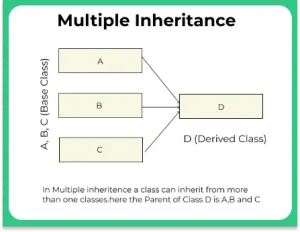What is Multiple Inheritance in C++
Multiple Inheritance
On this page we will discuss about Multiple Inheritance in C++ . The process where a single class acquiring the behaviors and capabilities from multiple classes called multiple inheritance . It is interesting to know, a child class in multiple inheritances a have more than one parent class at a time

Multiple Inheritance in C++
In Multiple Inheritance, A derived Class can have more than 1 Base Classes, thus it is deriving properties from various base Classes.
Example – In the image, D is a derived class which is deriving its properties from 3 different base classes, A, B and C.

Syntax to Implement Multiple Inheritance
class parent1
{
......;
};
class parent2
{
......;
};
class child:accces1 parent1,access2 parent2//multiple parents
{
-----;//data of both parent1 +parent2+child
};
- The class that is acquiring the behaviors is called child class or derived class or subclass
- The class from which behaviors are taken is called parent class or superclass or base class
- Here parent1 and parent2 are superclasses for a single derived class child
Example Program to understand Multiple Inheritance
#include <iostream>
using namespace std;
class P1 //parent 1
{
public:
void m1()
{
cout << "\n" << "m1 from parent p1-3sh";
}
};
class P2 //parent 2
{
public:
void m2()
{
cout << "\n" << "m2 from parent p2-rish";
}
};
class child:public P1, public P2
//multiple parents p1,p2
{
public:
void m3()
{
cout << "\n" << "m3 from childs own code-3shrish";
}
};
int main()
{
child c;
c.m1(); //derived from parent p1
c.m2(); //derived from parent p2
c.m3(); //Its own Method
}
Output:
m1 from parent p1-3sh m2 from parent p2-rish m3 from child's own code -3shrish
Here child class is having multiple parent P1 and P2 .it took m1() from p1 and m2() from P2 and its own method m3() hence child is having totally 3 methods
Ambiguity problem in multiple inheritance
Some times two class can have the same method name and If a child class inherits multiple classes in such case, there is an ambiguity problem in naming
#include <iostream>
using namespace std;
class P1
{
public:
void m1()
{
cout << "\n" << "m1 from parent p1-3sh";
}
};
class P2
{
public:
void m1() //same method name as P1
{
cout << "\n" << "m2 from parent p2-rish";
}
};
class child:public P1, public P2
//multiple parents p1,p2
{
// which method shoud inherit m1 ()from P1 or P2?
public:
void m3()
{
cout << "\n" << "m3 from childs own code-3shrish";
}
};
int main()
{
child c;
//c.m1();//derived from parent p1
// [Error] request for member 'm1' is ambiguous
c.m3(); //Its own Method and valid
}
Output
m3 from childs own code-3shrish
- In the above example, there is m1() in both classes P1 and P2 and child inherits both classes P1 and P2 In such it should inherit which m1() i.e m1() from class P1 or P2. Hence ambiguity is created upon calling m1();
- Hence, for this reason, OO-designers decided not to have Multiple inheritance in Java Language
Prime Course Trailer
Related Banners
Get PrepInsta Prime & get Access to all 200+ courses offered by PrepInsta in One Subscription
Get over 200+ course One Subscription
Courses like AI/ML, Cloud Computing, Ethical Hacking, C, C++, Java, Python, DSA (All Languages), Competitive Coding (All Languages), TCS, Infosys, Wipro, Amazon, DBMS, SQL and others






Login/Signup to comment